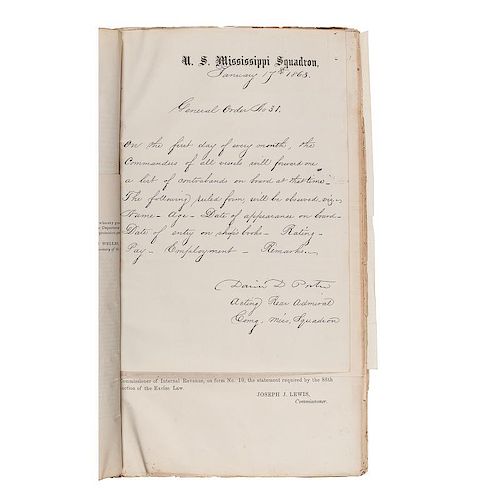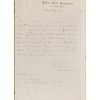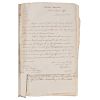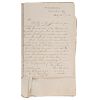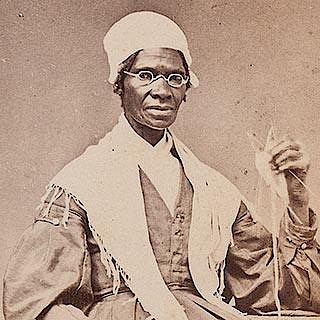Mississippi River Squadron Bound Order Book, 1861-1865
About Seller
6270 Este Ave.
Cincinnati , OH 45232
United States
With offices in Cincinnati, Cleveland and Denver, Cowan’s holds over 40 auctions each year, with annual sales exceeding $16M. We reach buyers around the globe, and take pride in our reputation for integrity, customer service and great results. A full-service house, Cowan’s Auctions specializes in Am...Read more
Two ways to bid:
- Leave a max absentee bid and the platform will bid on your behalf up to your maximum bid during the live auction.
- Bid live during the auction and your bids will be submitted real-time to the auctioneer.
Bid Increments
| Price | Bid Increment |
|---|---|
| $0 | $25 |
| $500 | $50 |
| $1,000 | $100 |
| $2,000 | $250 |
| $5,000 | $500 |
| $10,000 | $1,000 |
| $20,000 | $2,500 |
| $50,000 | $5,000 |
| $100,000 | $10,000 |
About Auction
Jun 9, 2017 - Jun 10, 2017
Cowan's Auctions dawnie@cowans.com
- Lot Description
One volume, 8 x 13 in., comprised of 73 documents, 48 printed circulars and orders, received by Acting Assistant Paymaster A.W. Pearson, and 25 manuscripts dating from October 19, 1861-August 27, 1865, concerning orders and policies of the Navy and Treasury departments, particularly relating to the Mississippi River Squadron, on such issues as provisions, clothing, and general stores; audits; salaries of officers and military personnel; enlistment records, records and payments of contrabands; expenses for food rations; etc. The manuscript items pertain to the same issues. Most of the manuscripts are letters sent from squadron paymasters to Pearson in his role as Acting Assistant Paymaster.
Alexander W. Pearson (ca 1834-1898) was born in Ireland and moved to the United States as a child. Before the Civil War he worked as a carpenter. He entered the US Navy as an acting assistant paymaster on July 22, 1862, and served in the Mississippi River Squadron or the Western Gunboat Flotilla, spending part of the time on the hospital ship USS Red Rover. He mustered out of the service on February 24, 1866. After the war he lived in Brooklyn, NY, where he worked in manufacturing and was very active in the local Masonic order. He died of a heart condition.
The USS Red Rover was the US Navy's first hospital ship. Originally a commercial side-wheel steamer, the vessel was built in Missouri in 1859 and was purchased in New Orleans in November 1861 by the Confederacy for a barracks ship. While the Red Rover was not armed, she did participate in the blockade of the Western Gunboat Flotilla of the Union Army on Island no. 10 in the Mississippi River, where she was damaged by the bombardment from the flotilla in March 15, 1862. The Red Rover was captured by Union forces when Island no. 10 fell on April 7, 1862. The vessel was subsequently refitted by the Union Army as a hospital ship and from June 1862 served the Mississippi Squadron in that capacity throughout the Civil War. The USS Red Rover was involved in the Vicksburg Campaign as well as the White River expedition. She was decommissioned in December 1865.
One letter in the collection is General Order No. 31, dated January 17, 1863, and written out in hand on US Mississippi Squadron letterhead: On the first day of every month, the Commanders of all vessels will forward me a list of all contrabands on board at that time. The following ruled form, will be observed-viz. Name-Age-Date of appearance on board-Date of entry on ship's books-Rating-Pay-Employment-Remarks. The order was written in a secretarial hand but signed by Acting Rear Admiral David D. Porter.
An example of the letters in the scrapbook to Pearson as acting assistant paymaster on the hospital ship, USS Red Rover, is one from late 1864 from E. W. Dunn, the Mississippi Squadron fleet paymaster. Written on the letterhead of Office Fleet Paymaster, US Mississippi Squadron, the order reads: When men, enlisted in the Naval Service since July 1, 1864, are transferred to you with the remark against their names ("Entitled to Bounty") you are authorized to credit them on your roll, with Bounty, as Specified by the act of Congress July 4th 1864 assuming in such cases that the Bounty Credit to which they are Entitled has not yet been given them. An earlier letter to Pearson, dated March 24, 1864, came from S.W.J. Tabor, an auditor in the Treasury Department, concerning pay for stewards on board the USS Red Rover. To your inquiry of the 15th inst. I reply, that the pay for all appointed Stewards, like the pay of Secretaries and Clerks, commences from the date when they leave their domicils [sic] in obedience to orders. When a Surgeons Steward is the sole medical officer on board, and is responsible for the medical stores under his charge, he is, by regulation, entitled to receive $40 a month from the date when and so long as he be in that position and no longer. If he have received an advance from the Navy Agent and die before he report, such an advance is authorized and at the risk of the Government. On August 22, 1864, Pearson received a letter from C. Storrs, Acting Auditor in the US Treasury Department concerning payments to certain individuals. In reply to your letter of the 9th Inst. I would state that the Navy Agents should discontinue payments upon all allotments after the expiration of the time, as reported by the Paymasters; unless some extenuating cause intervenes, for instance, when a man is detained beyond his term or known to be a prisoner of War. It is not necessary to notify the N. Agents to discontinue allotments when paid in full; such a course would only encumber the Office...
As the war was in its last days, paymasters such as Pearson still had much work to do, as indicated by this July 14, 1865 letter to Pearson from auditor Tabor. I reply in the affirmative to your inquiry of the 28th ulto. The general order of the Department, to which you refer, is to be obeyed irrespective of the fact, whether or not, the men are overpaid, when discharged. Such overpayments cannot lawfully arise, except from advances in Clothing & Small Stores necessary for their "health & comfort" and the Department, I presume, in issuing that order for discharge, regarded it as a greater economy to lose their overpayments, than needlessly to continue the payment of their wages. On August 19, 1865, Tabor wrote a letter to Pearson concerning the latter's duty regarding the payment of bounties. It is the duty of the Accounting Officers of the Treasury, to "take care that the laws (in relation to all receipts and disbursements of public moneys) be faithfully executed." The enclosed Circular, will indicate, explicitly, what is your duty in relation to the payment of Government bounties conferred for enlistment by the Acts of July 1st & 4th 1864. Any overpayments Paymasters may make in conflict with the provisions of those laws, I will feel it my duty to disallow in the settlement of their accounts.
An interesting collection of documents that highlight the business side of Union Army and Navy operations that historians have mostly ignored, as well as the role of a Union Navy paymaster.
Condition
The scrapbook in bound in board covered in marble paper with a black leather spine. The spine and the board covers are worn in spots, with the bottom third of the back cover missing the marble paper. Internally, the bottom of the pages and inside covers near the gutter show signs of having been burnt, without affecting the documents bound inside. Most of the volume's pages were cut, leaving a 1.25 in. tab on which the documents are attached by glue. One letter, dated August 8, 1865, has a 5.50 x 2.50 in. section cut out of the middle. The documents are in good condition.
- Shipping Info
-
SHIPPING. At the request of the buyer, Cowan's will authorize the shipment of purchased items. Shipments usually occur within two weeks after payment has been received. Shipment is generally made via UPS Ground service. Unless buyer gives special instructions, the shipping method shall be at the sole discretion of Cowan's Auctions, Inc.. Cowan's is in no way responsible for the acts or omissions of independent handlers, packers or shippers of purchased items or for any loss, damage or delay from the packing or shipping of any property.
-
- Buyer's Premium



 EUR
EUR CAD
CAD AUD
AUD GBP
GBP MXN
MXN HKD
HKD CNY
CNY MYR
MYR SEK
SEK SGD
SGD CHF
CHF THB
THB